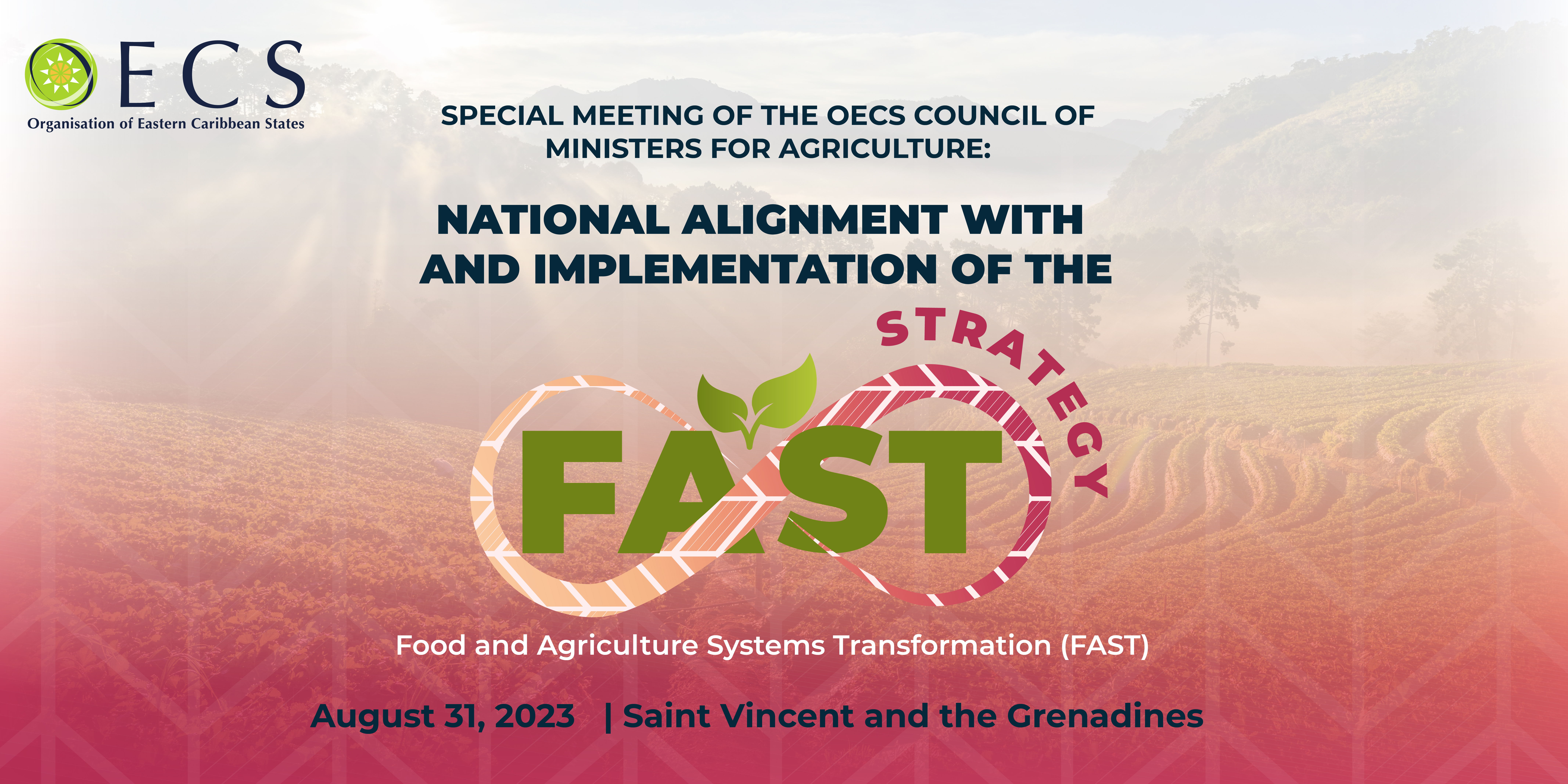[POSTPONED] Press Conference for the Special Meeting of the OECS Council of Ministers for Agriculture: National Alignment with and Implementation of the FAST Strategy
The Press Conference for the Special Meeting of the OECS Council of Minsiters: Agriculture has been postponed from Thursday, August 31, 2023 at 4:30 pm and will instead take place after the FAST Strategy Private Sector Engagement Event tomorrow, Friday, September 1, 2023.
FAST Private Sector Engagement Event and Panel Discussion:
What: Panel discussion themed: "Strategies to combat food insecurity in the OECS through private sector investment"
When: September 1, 2023
Time: 9:00 am
Where: National Insurance Services (NIS) Conference Room, NIS Building, Upper Bay Street, Kingstown. St. Vincent & the Grenadines
Virtual: Join on OECS or ITFX SVG Facebook and YouTube pages.
Press Conference:
What: Press Conference for a Special Meeting of the OECS Council of Ministers: Agriculture - National Alignment with and Implementation of the FAST Strategy
When: Friday, September 1, 2023
Time: 11:30 am
Where: National Insurance Services (NIS) Conference Room, NIS Building, Upper Bay Street, Kingstown. St. Vincent & the Grenadines
Virtual: Click here to join virtually. (Password: 811019)
Background
The Food and Agriculture Systems Transformation (FAST) Strategy was introduced and discussed at the Sixth OECS Council of Ministers: Agriculture on October 14th, 2022. It is the new ten-year regional strategy for agriculture as mandated by Article 20 of the Revised Treaty of Basseterre (RTB). In Article 20, Member States agree “to the development of an agriculture policy that offers a strategic framework for prioritising regional programs” and “commit to the transformation of the agriculture sector through:
(a) modernisation based on adoption of best practices and standards
(b) joint strategic frameworks;
(c) national policies which complement regional initiatives
(d) private/public sector partnerships and investments.”
The vision in the FAST Strategy is to establish competitive sustainable food and agriculture production, processing and distribution practices that will result in increased consumption of affordable, quality, and nutritious food, increased food self-reliance, and increased social and economic development. The FAST Strategy is designed to achieve the vision and goals through implementing changes in the institutional, production, trade and consumptions systems, using sustainable green and blue economy resources and approaches. It is built around seven pillars as listed below:
-
Pillar 1: Addressing the implementation deficit
-
Pillar 2: Natural resource management
-
Pillar 3: Transportation systems and logistics
-
Pillar 4: Innovation
-
Pillar 5: Trade and investment policy and facilitation
-
Pillar 6: Institutional network development
-
Pillar 7: Private sector development
At the Seventh OECS Council of Ministers: Agriculture on June 30th 2023, Ministers agreed to prioritise actions under the FAST Strategy, including that the Commission focus on three core areas/pillars from the FAST Strategy for developing its work programme for the next three years, namely:
-
Private sector development: production, processing and distribution through import substitution, mechanisation and shared core functions across the region
-
Transport, logistics and trade through establishing regional associations, upgrades to shipping services and infrastructure and leveraging international trade policy for food self-reliance
-
Climate resilient agriculture through climate smart agricultural standards, biodiversity protection, and a water programme which incorporates water supply studies, water use technology and training in water systems.
Additionally that the Commission:
-
Design regional level interventions on youth in agriculture, building on national level interventions which demonstrate best practice.
-
Mainstream gender, innovation and technology across agriculture interventions as important cross-cutting themes.
-
Prioritise data and statistics and the OECS Commission determine what more can be done to support national initiatives and promote best practice, building on already existing projects like the World Bank’s Data for Decision Making.
-
Influence the research agendas of regional universities and research and development institutions to address some of the most challenging issues facing the sector.
COM:A Objectives:
At the Special Meeting of the OECS Council of Minsiters: Agriculture on August 31, 2023, delegates will assess how each member state is contributing to delivery of the FAST Strategy at a national level and will provide recommendations on what more can be done nationally to complement regional initiatives. The FAST Private Sector Engagement Event and Panel Discussion on Septemeber 1, 2023 will engage stakeholders in the strategy's implementation. Key regional experts will discuss the national and regional opportunities which could be used to improve national and regional food security.
